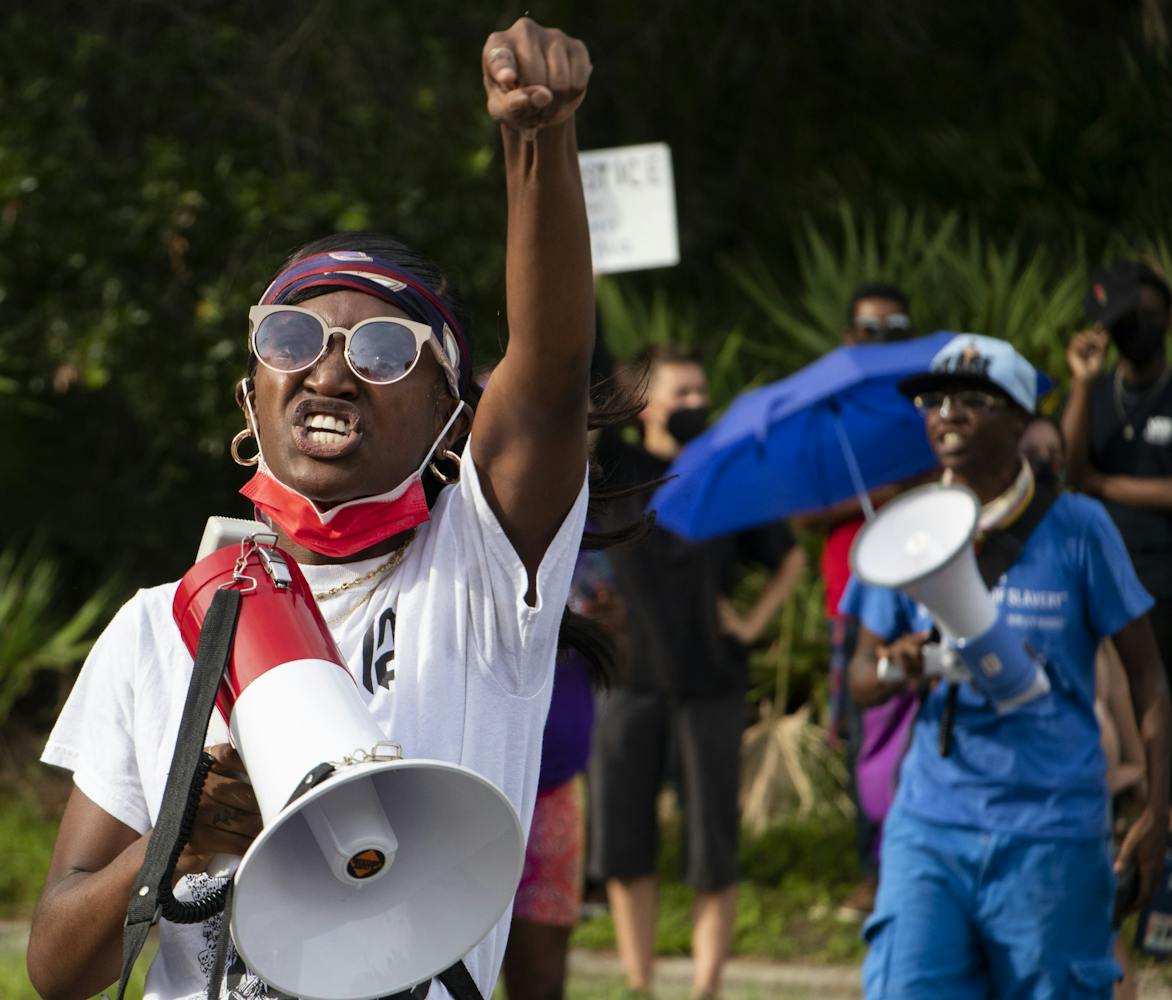Cries from a jail cell are not unheard of. But pursuant to state law, the tears of a newborn behind bars should be.
Protests erupted in Gainesville Aug. 11 and Aug. 21, after Erica Thompson gave birth in an Alachua County Jail cell and lost her baby hours later at UF Health Shands Hospital. Activists are pointing to HB 1259, also known as the “Tammy Jackson Act,” in a local case similar to Jackson’s.
Jackson will be remembered in the Florida Legislature as the namesake for a law improving the treatment of pregnant inmates in labor. In April 2019, Jackson lived through seven hours of labor without medical assistance inside the Broward County Jail. Her story is now being echoed across Alachua County after Thompson, a 25-year-old Gainesville resident, experienced a similar reality.
Tray Johns, a 46-year-old lobbyist who has been in contact with Thompson, was essential in passing the Tammy Jackson Act, which took effect July 1, 2020 after being signed by Gov. Ron DeSantis.
“The similarities between Tammy Jackson and Erica Thompson: it’s almost the same,” Johns said. “Two Black women, two women that was clearly, clearly and visibly pregnant, clearly and visibly screaming for help.”
The law grants inmates in labor proper care, including being taken to a medical facility and not placed in restrictive housing. Although the details of the investigation aren’t released, activists claim Thompson was in restrictive housing while in labor.
Amid celebration in 2019 after Florida passed the Dignity for Incarcerated Women Act, which gave female inmates free access to pads and tampons, Johns received a call informing her of a woman who had just given birth in Broward County Jail.
In April 2019, Jackson was left to suffer alone in Broward County Jail’s solitary confinement where she was in labor for seven hours without medical attention, according to her lawyers. After being ignored by staff while in pain, Jackson had to crouch to the floor and catch her baby. In a news report, Jackson recalled being horrified and apologizing to her newborn for the drop.
Fast forward to 2021, history is repeating itself.
Thompson posted on Facebook Aug. 10 retelling her story of grief after losing her child.
“About 11 p.m. last night I delivered my child by myself all alone in my jail cell in my bed,” she wrote. “They finally believed me when they walked in and I was holding my child.”
Law enforcement, however, disputes certain details of what happened to Thompson.
Kaley Behl, ACSO spokesperson, insisted the Tammy Jackson Act was not violated by the jail. Because the investigation is ongoing, ACSO would not disclose more information.
“When the Tammy Jackson Act was passed … we were ahead of the game, making sure that our policies complied with the law even before the accreditation standards took effect and we were bound by them,” Behl said. “So we were on the front end of it. We are definitely not violating the law.”
She doubts the security footage will be released, but photos from an ACSO press conference Aug. 20 show Thompson with emergency responders.
Johns argues ASCO is covering its tracks with the photos and the law was broken because all jails are restrictive housing.
“[The law] specifically says that a woman should not be kept in restrictive housing while giving birth, and she should be transferred to a facility that's basically conducive for giving birth,” she said. “There's no jail facility or no place inside of a jail that's conducive to giving birth.”
Bob Dekle, a retired UF law professor, is unsure if ACSO violated the Tammy Jackson Act in this case.
“The question in my mind would be, ‘Did they respond to the medical situation in a timely fashion,’’ which doesn’t have anything to do with the Tammy Jackson Act,” Dekle said. “The law requires the custodian of a prisoner to take care of the prisoner and see to the prisoner's medical needs.”
Florida Prisoner Solidarity and Dream Defenders reached out to Thompson after she shared her story. Thompson then called Johns — the organizer who was integral in passing the Tammy Jackson Act. She knew Johns had helped Jackson after the birth of her child Miranda in jail.
Hatdrika Noble-Monroe, a 27-year-old East Gainesville native, said she was appalled to learn about what happened to Thompson.
“Not only was it illegal what was done to her, but it was simply not humane at all,” Noble-Monroe said. “Being a mother, being a woman, things such as this should not occur, especially when there’s medical attention that can be obtained.”
This hasn’t been the only trouble the community has had with ACSO. Growing up, Noble-Monroe was told stories of her uncle, Sylvester Strong, who her family believes died because of the Alachua County Jail’s negligence.
At 6-years-old, Noble-Monroe remembers visiting her uncle who was in a diabetic coma because he got his medication late. Recalling the emotions her family went through, she said she was one of the first people to share Thompson’s Facebook message and believe her story.
“They should release the video,” Noble-Monroe said. “This is feeding into the lack of trust that we have for them, and this is why we do not trust law enforcement. This is why we struggle with building and bridging the relationship between the community and law enforcement.”
The question on the minds of activists was plastered on a poster in white, yellow and red letters at a protest last week where demonstrators occupied roads in front of the Alachua County Jail — “Was the Tammy Jackson Act passed for nothing?!”
Karine Dieuvil, a 21-year-old lead organizer with GoDDsville Dream Defenders, remains unconvinced by the photos released to the public. To Dieuvil, they only show half of the truth.
“The fact that there was a police officer right next to Erica Thompson hearing her scream for help and nobody came until after her seven-month-old premature baby was delivered tells me in and of itself that there is nothing that you can excuse in a video,” Dieuvil said. “The only thing that I think is acceptable at this point from the sheriff's office, if words are all they're going to provide, is an apology.”
In response to what happened to Thompson, Johns is working to create a new act called “Protecting the Dignity of Women and Infants” or “Ava’s Law” to support Thompson and other women in similar positions. Johns said she’s collaborating with Florida State Sen. Shevrin Jones to see the legislation to fruition.
“The Tammy Jackson Act basically dealt with giving birth in solitary confinement,” Johns said. “But Ava's law goes one step further to just basically catch and release pregnant women that are arrested for nonviolent offenses.”
The new proposal would make it so women visibly pregnant and with non-violent offenses would be released back to their home with a ticket to appear in court at a later date after being booked in jail. Women who are in labor will receive emergency services and be transferred to a facility.
Contact Isabella Douglas at idouglas@alligator.org. Follow her on Twitter @Ad_Scribendum.

Isabella Douglas is a fourth-year journalism major and the Fall 2023 editor-in-chief for The Alligator. She has previously worked as the digital managing editor, metro editor, criminal justice reporter and as a news assistant. When she isn't reporting, she can be found reorganizing her bookshelf and adding books to her ever-growing TBR.

















